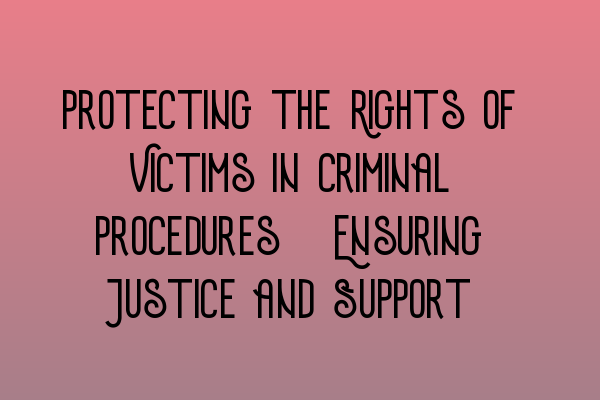Protecting the Rights of Victims in Criminal Procedures: Ensuring Justice and Support
When it comes to criminal procedures, it is crucial that we do not forget about the rights and well-being of the victims. They are often the ones who have experienced physical, emotional, and psychological harm, and it is our duty as legal professionals to ensure that they are fully supported throughout the entire process. In this blog post, we will discuss the importance of protecting the rights of victims in criminal procedures and how it contributes to a fair and just legal system.
Providing Essential Support
First and foremost, it is essential to provide victims with the necessary emotional and practical support. As legal professionals, we should be equipped to offer guidance and resources to help them cope with the trauma they have endured. This support can come in various forms, such as counseling services, information about their rights, and referrals to victim support organizations.
By offering this support, we empower victims to participate actively in the criminal process. It is crucial for them to fully understand their role and the progress of the case. This knowledge allows victims to make informed decisions and feel that justice is being pursued on their behalf.
In addition to emotional support, victims should also receive updates and information about court proceedings. They have the right to be informed about key developments, such as arrest, bail, charge, trial, and sentencing. By keeping victims in the loop, we ensure transparency and build trust in the legal system.
Advocating for Victim Rights
Advocacy plays a crucial role in protecting the rights of victims in criminal procedures. As solicitors, we must prioritize the interests and rights of the victims we represent. This means ensuring that their voices are heard and their needs are addressed throughout the legal process.
One key aspect of advocating for victim rights is assisting them in making victim impact statements. These statements allow victims to express the emotional and physical impact of the crime on their lives. By providing victims with a platform to tell their stories, we allow them to have a say in the sentencing process, which helps bring a sense of closure and justice.
Furthermore, we need to ensure that victims are protected from any potential harm or intimidation. This may involve obtaining restraining orders, implementing safety measures, or providing support during court appearances. By taking proactive steps to safeguard their well-being, we empower victims to feel safe and secure as they navigate the criminal justice system.
Building a Victim-Centered Legal System
The ultimate goal is to create a legal system that is victim-centered. This means placing the well-being and rights of victims at the forefront of criminal proceedings. One way to achieve this is by promoting restorative justice practices.
In restorative justice, the focus shifts from punishment to repairing the harm caused by the crime. It involves facilitating communication and understanding between the victim, offender, and community. By engaging in this process, victims have the opportunity to directly address the impact of the crime and receive an apology or restitution.
Furthermore, it is important to encourage collaboration and cooperation between legal professionals, victim support organizations, and the police. By working together, we can ensure that victims receive appropriate support and that their rights are protected throughout the entire legal process.
In conclusion, protecting the rights of victims in criminal procedures is fundamental to ensuring justice and support. By providing essential support, advocating for victim rights, and building a victim-centered legal system, we can create a more equitable and fair criminal justice system for all parties involved.
For more information about the SQE Criminal Law & Practice Law UK, please visit our website:
